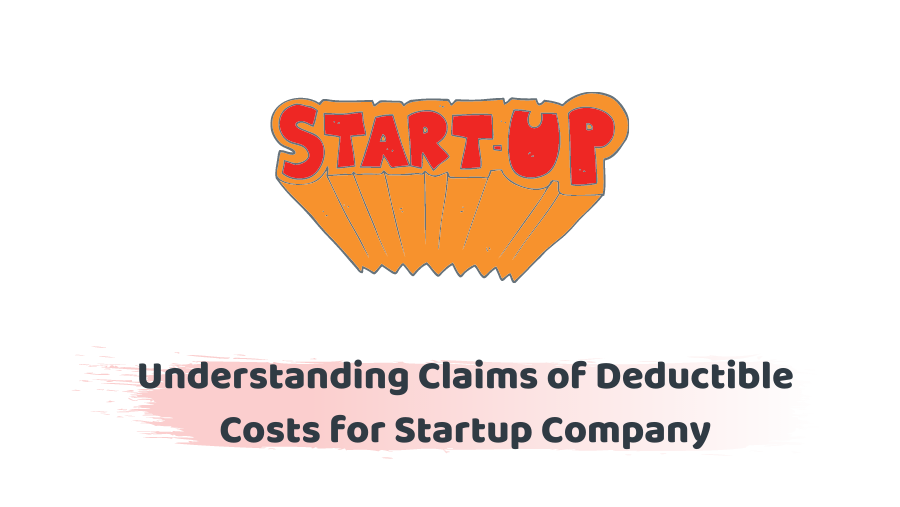The easiest part of launching a startup is typically having an idea. The hardest part? For many, it’s the finances.
Your idea won’t go far if it can’t be supported, so in the early stages, it is critical to identify which starting costs are needed to get your company off the ground. Among the numerous challenges startups encounter, a shortage of cash flow is common. Most suffer many sunk costs during their infancy that are not recoveries even when the company succeeds. Therefore, a developed business plan is a must to provide a good understanding of the resources needed to run effectively.
Part of building a sustainable financial strategy should include taking advantage of any deductibles and reliefs you are eligible for in order to lower tax expenses. This can involve reliefs such as R&D Tax Relief, Patent Box Relief, and more.
A challenge, though, is taking advantage of these deductible costs for startup incurred before your business was even set up. Perhaps the most important thing for you to learn about, here, are the pre-trading expenditures you can claim as tax-related deductions.
To assist you in gathering all of your deductible costs for startups in one place and ensuring that no costs are overlooked. Our startup accountants are always available to help you.
The Guidelines to Claiming These Deductible Costs for Startup
Pre-Trade Expenses
Startups that successfully transcend the border of ideas and enter the execution sector must cope with various outflows. Depending on its activities, the company may need specialized premises to operate from a warehouse to store products and other amenities. A set of costs awaits prospective business owners who have desires but lack the means to make it a reality. Until the company begins operations, organizational costs do not include these tax-deductible expenditures.
HMRC Guidelines
To calculate the profit or loss for the first accounting year, the profit or loss computation under S57 Income Tax (Trading and Other Income) Act 2005, S61 Corporation Tax Act 2009 pre-trading expenditure must include pre-trading expenditure. No separate compensation claim is required.
Let’s assume that you start a business and work as an employee to attract workers and locate suppliers. In this case, you can pay yourself as well. Salary withdrawal is permitted by HMRC and is included in the deductible beginning costs. In its first year, the company’s revenue will cover this.
The HMRC rules allow businesses to defer expenses for up to 7 years before starting a business. In some instances, like a construction business, it may take longer than usual, although HMRC will make concessions. If a startup is not stable and prosperous after seven years, the lack of a healthy cash flow is likely due to a poor business model or other factors.
How Can a Startup Business Claim Relief for Pre-trading Expenses?
Interest payments may be included in the company’s pre-trading expenses. A company may take out loans to fund assets, pay personnel, or cover any licensing fees due shortly. The expenses of obtaining this debt financing are referred to as non-trading debits since they were incurred before the company could begin trading.
Per the loan relationship guidelines, a company’s pre-trading interest may only use a non-trading deficit to offset any corporation tax deduction. However, a company’s non-trade credit income and pre-trade interest expense reduction may take years.
If you’re still unsure about business claim relief or deductible costs for startup, then get benefits from the guidance of our professional startup accountants in London and clear your doubts
Exceptions on Business Claim Relief
Some expenditures, such as rents for a post-trading period or other prepayments, cannot be regarded as pre-trading expenses. Such payments should be handled using the matching principle, which means that expenditures should be offset against revenue from the same period in which the obligation occurs. Theoretically, companies incur costs prior to operating. However, they already come within the scope of tax-deductible expenses. They do not need to be justified as pre-trading tax deductible starting expenses.
Final Thoughts
It’s not overstated to say that startups are small economic engines that have the potential to drive a country’s economy onwards. Due to their flexible structure, startups may quickly turn ideas into products, while bureaucratic setups of previously established companies take longer. On the other note, cash flow management is the most difficult for a business that has yet to trade but is currently incurring costs. If incurred on the first day of trade, these costs reduce the period’s revenue and, eventually, tax expenses.
Building a startup business can be exciting and challenging, especially when faced with financial woes. At Accotax, we have a group of reliable accountants for startups in London that can help you face any financial claims and obligations! Call us today to learn more!





















































